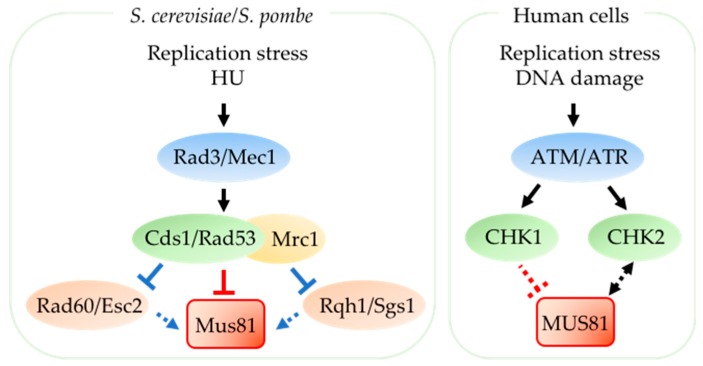Figure 3.
Mus81 regulation by replication checkpoint. In yeast, replication stress induces Rad3S.p./Mec1S.c. (ATR in human) activation of Cds1S.p./Rad53S.c. by promoting its association with Mrc1S.p./S.c. (CLASPIN in human) (reviewed in [80]). Upon acute and severe replication stress such as hydroxyurea treatment, Cds1S.p. limits Mus81S.p. activity (indicated by solid red line) [44]. Cds1S.p. inhibits Rad60S.p. activity (indicated by blue line) by promoting delocalization from the nucleus [82,83]. Mrc1S.p./S.c. protein level regulates recruitment of Rqh1S.p. homolog Sgs1S.c. to chromatin (indicated by blue arrow) [74]. Both Rad60S.p./Esc2S.c. and Rqh1S.p./Sgs1S.c. contribute to Mus81 activity (indicated by dashed blue arrow) [75,76]. In human cells, DNA damage checkpoint CHK1 and Cds1-homolog CHK2 is activated downstream of ATM/ATR kinases (reviewed in [79,80]) [77]. It is unclear whether MUS81 is directly regulated by these checkpoint kinases in human cells. However, there is evidence that CHK2 upregulates MUS81 protein levels and MUS81 in turn contributes to CHK2 activation upon DNA damage (indicated by dashed double-headed arrow) [84]. Deleterious MUS81-dependent processing of replication intermediates following CHK1 inhibition suggests that CHK1 downregulates MUS81 activity (indicated by dashed red line) [68,69,70].

